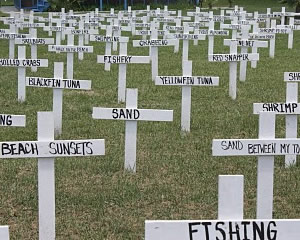|
What Can the Oil Spill Teach Us?
Lessons From Deepwater Horizon Disaster
Andrew Guswa, the Smith College faculty member who spearheaded the integration of Deepwater Horizon's lessons throughout the college curriculum, is also serving on a University of Massachusetts team planning to do the same at the flagship university in 2011-12.
NORTHAMPTON, Mass. – The 2010 Deepwater Horizon oil spill – an environmental and economic disaster of epic proportions – presents a broad and urgent learning opportunity for today’s college students and tomorrow’s global leaders. Smith College is among a number of colleges and universities seizing the opportunity to integrate the study of the catastrophe throughout its curriculum.
At Smith, the following areas of study have integrated the disaster into courses.
| |
 |
| |
Photo by Rachel Rock-Blake '09 |
Biology
Since last fall, faculty members have been examining oil extracted from the spill to determine the extent of the environmental impact. Michael Barresi, assistant professor, is researching the toxicity of the oil and dispersants to developing fish embryos. Students in his course and two others have also used samples from the spill in a variety of experiments. Grace Anderson was part of a student team that investigated the effects of crude oil on intertidal interactions among species.
“I’d never smelled crude oil,” said Anderson, a junior. “It is horribly stinky – just even a little bit would smell through the entire lab – and really gave me a sense of how toxic it is.”
Comparative literature
In a course taught by Professor Anne Leone, students examined media coverage for terms used to describe the oil spill as well as the variety of publications that featured coverage. “How has the language spun the story?” said Leone. “Choose a ‘voice’ or lens and examine its message.”
One student looked at right-wing Christian newspapers that described the spill as “apocalyptic” and another at fashion magazines, such as ”Italian Vogue,” which presented a layout in which models were coated in oil.
Economics
During the spring semester, Susan Sayre, assistant professor of economics, plans to assign students to calculate the cost of the spill, determining first how the cost should be measured and what should be included.
Mathematics
Students working with Catherine McCune, director of the college’s Spinelli Quantitative Learning Center, examined how quantitative information about the disaster was presented. A quantity may be represented through an approximation or a specific number, she said, or through an analogy such as “a plume the size of Manhattan,” leading to interpretations that either provided a greater or lesser understanding of the disaster, they found.
Philosophy
Students in Elizabeth Spelman’s spring course “Morality, Politics and the Law” will examine whether the government is more vigilant in its support of laws that protect corporate secrecy than its enforcement of laws that keep tabs on corporate malfeasance.
“Among the revelations gushing forth from the Deepwater Horizon crisis is the lack of public scrutiny of corporations in the oil business,” said Spelman, the B. Richmond 1940 Professor of Philosophy.
Program for the Study of Women and Gender
Elisabeth Armstrong, associate professor, plans to integrate the oil spill into her course “Women, Money, Transnationalism.” Her goal is to engage students in community-based research that examines the federal assistance promised to low- and middle-income residents in the aftermath of Hurricane Katrina to the reimbursements promised for the Deepwater Horizon spill.
“Both disasters highlight the way natural disasters meet human negligence,” said Armstrong. “They reveal the long-term undervaluing of vulnerable people’s lives and eco-systems.”
Smith College educates women of promise for lives of distinction. One of the largest women’s colleges in the United States, Smith enrolls 2,800 students from nearly every state and 62 other countries. The Smith Design for Learning, the college’s strategic plan, highlights the importance of bringing knowledge, research and action to bear on compelling societal issues.
-30-
|























